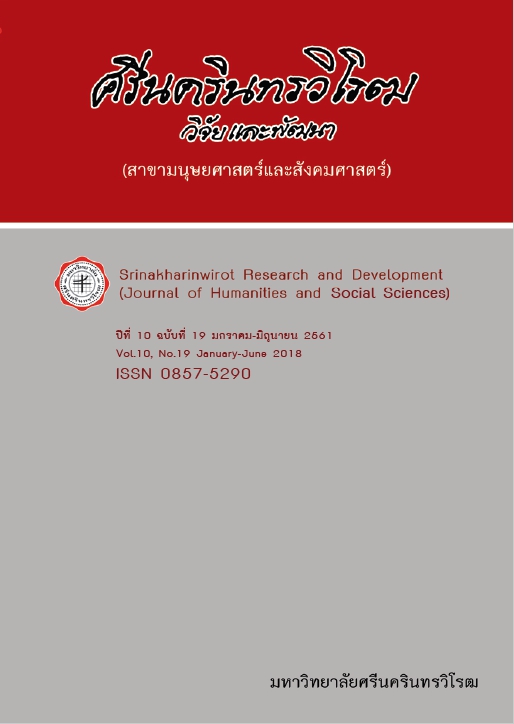การบริหารจัดการพื้นที่มรดกโลกในจังหวัดพระนครศรีอยุธยาของเทศบาลนครพระนครศรีอยุธยาตามปรัชญาของเศรษฐกิจพอเพียง (ADMINISTRATION OF WORLD HERITAGE AREA IN AYUTTHAYA PROVINCE OF AYUTTHAYA CITY MUNICIPALITY ACCORDING TO THE SUFFICIENCY ECONOMY PHILOSOPHY)
Keywords:
Administration, World Heritage Area, Ayutthaya Province, Ayutthaya City Municipality, the Sufficiency Economy PhilosophyAbstract
Objectives of this research were to study (1) problems of administration of world heritage areas in Ayutthaya Province of Ayutthaya City Municipality according to the Sufficiency Economy Philosophy, (2) development guidelines for administration of world heritage areas in Ayutthaya Province of Ayutthaya City Municipality according to the Sufficiency Economy Philosophy, (3) critical factors for successful administration of world heritage areas in Ayutthaya Province of Ayutthaya City Municipality according to the Sufficiency Economy Philosophy, and (4) administrative model of world heritage areas in Ayutthaya Province of Ayutthaya City Municipality according to the Sufficiency Economy Philosophy.
Research methodology this research was a mixed method research using quantitative research as main means and supported by qualitative research. Quantitative research used questionnaire with validity check at 0.94 level and reliability check at 0.96 level for field data collection from September 1 to December 31, 2014. Total samples were 1,087 residents in 10 sub-districts of Ayutthaya City Municipality. Total 976 sets of completed questionnaires were collected, representing 89.79% of all samples. Statistics used were mean, standard deviation, multiple regressions, and Pearson’s correlation. The in-depth interviews of 9 experts were done by structured in-depth interview form for qualitative information.
Research findings revealed that (1) the significant administrative problem was the Municipality Executives had not applied their ideas, information, and administrative capacities for vendor ordering in the world heritage areas; (2) the major development guidelines was the Municipality Executives should inclusively apply their ideas, information, and administrative capacities for vendor ordering in the world heritage areas as well as intensively supervise the implementation; (3) the major success factor was the Municipality Executives should have leadership such as be initiative, be creative, and make good decision based on public interest in vendor ordering in the world heritage areas; and (4) the administrative model according to the Sufficiency Economy Philosophy consisted of 8 aspects, namely, networking establishment, moderation, rationality, cohesiveness, balance and sustainable development, strengthening the qualities of people in both knowledge and morality, self-immunity, and self-reliance.
Downloads
References
[2] กรมศิลปากร. (2533). แผนแม่บทโครงการอนุรักษ์และพัฒนานครประวัติศาสตร์พระนครศรีอยุธยา. กรุงเทพฯ: กรมศิลปากร. สืบค้นเมื่อ 14 สิงหาคม 2558 จาก http://www.digital.nlt.go.th/items/show/2660#?c=0&m=0&s=0&cv=0
[3] วิรัช วิรัชนิภาวรรณ. (2550). การบริหารจัดการตามแนวทางคุณธรรมและแนวทางเศรษฐกิจพอเพียง. กรุงเทพฯ: โฟร์เพซ.
[4] วิรัช วิรัชนิภาวรรณ. (2552). การบริหารจัดการของหน่วยงานของรัฐ: การวิเคราะห์เปรียบเทียบตัวชี้วัด. กรุงเทพฯ: โฟร์เพซ.
[5] Creswell, J. W., Plano Clark, V. L, and Garrett, A. L. (2008). Methodological issues in conducting mixed methods research designs. In Advances in Mixed Methods Research: Theories and Applications. Manfred M. Bergman (ed.). London: Sage. pp. 66-83.
[6] Yamane, Taro. (1967). Elementary Sampling Theory. Englewood Cliffs, New Jersey: Prentice Hall.
[7] ผู้ให้สัมภาษณ์สำหรับการวิจัยเชิงคุณภาพ จำนวน 9 คน ประกอบด้วย
(1) นางสาวกฤษณา สุพรรณพงษ์. อดีตผู้ตรวจราชการกรมพัฒนาชุมชน สัมภาษณ์ วันที่ 12 มกราคม 2558 ณ โรงแรมทองธารา กรุงเทพมหานคร.
(2) นายไพโรจน์ เอื้อประเสริฐ. อดีตนายกเทศบาลเมืองอุตรดิตถ์ สัมภาษณ์ วันที่ 25 มกราคม 2558 ณ โรงแรมทองธารา กรุงเทพมหานคร.
(3) นายเขมชาติ เทพไชย. ผู้เชี่ยวชาญฝ่ายพิพิธภัณฑ์ อดีตรองอธิบดีกรมศิลปากร สัมภาษณ์ วันที่ 19 มกราคม 2558 ณ มหาวิทยาลัยมหิดล จังหวัดนครปฐม.
(4) นายวีระ ประสพศักดิ์. อดีตอาจารย์โรงเรียนนครหลวงอุดมรัชต จังหวัดพระนครศรีอยุธยา สัมภาษณ์ วันที่ 15 มกราคม 2558 ณ องค์การบริหารส่วนตำบลนครหลวง จังหวัดพระนครศรีอยุธยา.
(5) นายวิศว ศะศิสมิต. อดีตผู้ว่าราชการจังหวัดอ่างทอง ผู้ตรวจราชการกระทรวงมหาดไทย สัมภาษณ์เมื่อ วันที่ 29 ธันวาคม 2557 ณ โรงแรมทองธารา กรุงเทพมหานคร.
(6) นายธารทิพย์ มีลักษณะ. ผู้อำนวยการสำนักงานท่องเที่ยวและกีฬาจังหวัดพระนครศรีอยุธยา สัมภาษณ์ วันที่ 26 มกราคม 2558 ณ สำนักงานท่องเที่ยวและกีฬาจังหวัดพระนครศรีอยุธยา.
(7) นายณรงค์ อ่อนสะอาด. ผู้ว่าราชการลำพูน อดีตรองผู้ว่าราชการจังหวัดพระนครศรีอยุธยา สัมภาษณ์ วันที่ 5 มกราคม 2558 ณ ห้องทำงานผู้ว่าราชการจังหวัดลำพูน.
(8) นายจรัญ ชื่นในธรรม. ผู้อำนวยการกลุ่มฐานข้อมูลการตลาด การท่องเที่ยวแห่งประเทศไทย สัมภาษณ์ วันที่ 30 ธันวาคม 2557 ณ อาคารสำนักงานการท่องเที่ยวแห่งประเทศไทย ถนนเพชรบุรี
กรุงเทพมหานคร.
(9) นายสืบศักดิ์ เอี่ยมวิจารณ์. รองผู้ว่าราชการจังหวัดพระนครศรีอยุธยา สัมภาษณ์ วันที่ 26 มกราคม 2558 ณ ห้องทำงานรองผู้ว่าราชการจังหวัดพระนครศรีอยุธยา.
[8] กมลสร ฐานวิเศษ. (2556). การศึกษาผลกระทบทางสังคมรอบอุทยานประวัติศาสตร์พระนครศรีอยุธยาจากนโยบาย การพัฒนาการท่องเที่ยว. กรุงเทพฯ: มหาวิทยาลัยเทคโนโลยีราชมงคลธัญบุรี.
[9] Boston, J., Martin, J., Pallot, J. and Walsh, P. (1996). Public Management: The New Zealand Model. Auckland: Oxford University Press.
[10] สำนักงานคณะกรรมการข้าราชการพลเรือน. (2554). พระบรมราโชวาทของพระบาทสมเด็จพระเจ้าอยู่หัว พระราชทานแก่ข้าราชการพลเรือน เนื่องในโอกาสวันข้าราชการพลเรือน พุทธศักราช 2540-2552. กรุงเทพฯ: สำนักงานคณะกรรมการข้าราชการพลเรือน.
[11] Robbins, Stephen P. (2004). Essentials of Management: Essential Concepts and Applications. New Jersey: Pearson Education, Inc.
[12] วรเดช จันทรศร. (2554, มกราคม-มิถุนายน). การน้อมนำหลักเศรษฐกิจพอเพียงมาประยุกต์ใช้ในการจัดการภาครัฐ. วารสารปัญญาภิวัฒน์. 1-18.
[13] Denhardt, J. V. & Denhardt, R. B. (2003). The New Public Service: Serving, not Steering. 9th ed. New York: M.E. Sharpe.
Downloads
Published
How to Cite
Issue
Section
License
Srinakharinwirot Research and Development Journal of Humanities and Social Sciences is licensed Under a Creative Commons Attribution-NonCommercial-NoDerivs 4.0 International (CC-BY-NC-ND 4.0) License, Unless Otherwise Stated. Please Read Journal Policies Page for More Information on Open Access, Copyright and Permissions.



